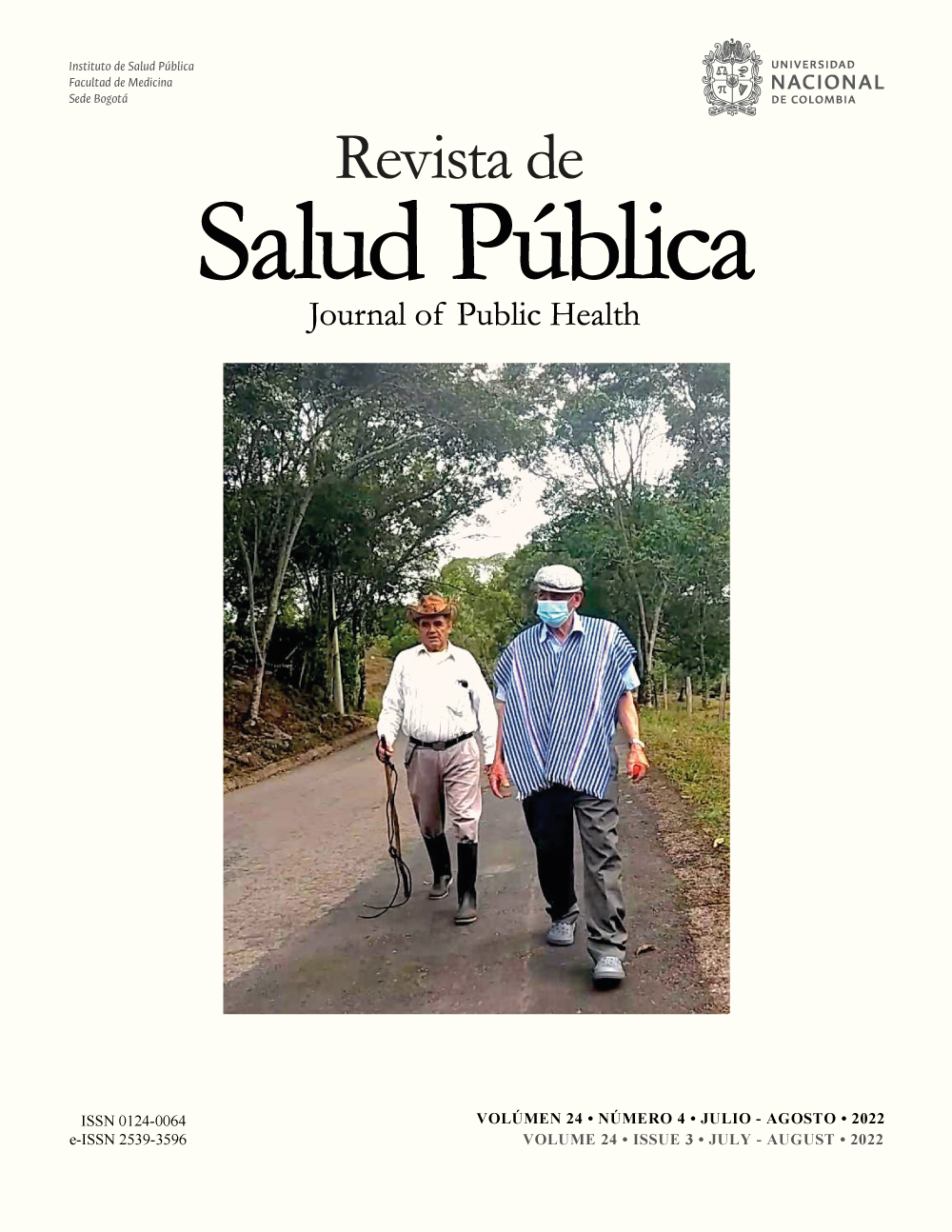Recursos y vulnerabilidades de comunidades migrantes en Chile para enfrentar la pandemia SARS-CoV-2
Resources and vulnerabilities of migrant communities in Chile during the SARS-CoV-2 pandemic
DOI:
https://doi.org/10.15446/rsap.v24n4.99551Palabras clave:
Emigración e inmigración, infecciones por coronavirus, vulnerabilidad social (es)Emigration and immigration, coronavirus infections, social vulnerability, qualitative research (en)
Descargas
Objetivo Conocer, en contexto de la pandemia por SARS-CoV-2, las vulnerabilidades psicosociales y socioeconómicas de la población migrante internacional en Chile y los recursos y capitales sociales reportados desde la propia comunidad.
Métodos Estudio cualitativo descriptivo. Se realizaron 40 entrevistas semiestructuradas a migrantes (N=30) e informantes claves (N=10), ejecutadas virtualmente durante el 2020. El material fue analizado mediante análisis temático. El proyecto fue aprobado por el Comitè de Ètica Científico de la Facultad de Medicina de la Universidad del Desarrollo.
Resultados Como principales vulnerabilidades enfrentadas por parte de personas migrantes en pandemia se identifican: hacinamiento, precariedad laboral y necesidades económicas, uso del transporte público, desinformación y creencias en torno al COVID-19, discriminación, falta de redes de apoyo, y estatus migratorio. Como recursos se reconocen: contar con redes de apoyo, posibilidad de teletrabajo o salir a trabajar, acceso a información y a la red asistencial y municipal, apoyo gubernamental y de la sociedad civil. Adicionalmente, se reportan experiencias de diagnóstico de COVID-19, identificando dificultades en acceso a PCR y adaptaciones familiares y laborales como cambios en los hábitos de vida dentro y fuera del hogar.
Discusión El estudio entrega información relevante e inédita para la construcción de políticas en salud para migrantes internacionales con foco en crisis sanitarias. Se destaca la necesidad de fortalecer adecuaciones interculturales en las estrategias de prevención del contagio y de promoción de la salud y aumentar la disponibilidad de respuesta en el acceso a salud en el marco de la pandemia, mitigando así la vulnerabilidad social en migrantes y potenciando sus recursos de afrontamiento.
Objective To know, in the context of the SARS-CoV-2 pandemic, the psychosocial and socioeconomic vulnerabilities experienced by the international migrant population in Chile, as well as the resources and social capital reported from the community itself and its support networks, and to analyze the reception and implementation of the measures recommended by the health authorities in the different stages of the pandemic in the country.
Methods Descriptive qualitative study. The information was collected through 40 semi-structured individual interviews with migrants (N=30) and key informants (N=10), carried out through online communication platforms during 2020. A thematic analysis of the material was carried out. The project was approved by the Scientific Ethics Committee of the Faculty of Medicine of the Universidad del Desarrollo.
Results The main vulnerabilities experienced by migrants in the context of the pandemic include overcrowding, job insecurity and economic needs, use of public transport, misinformation and beliefs about COVID-19, experiences of discrimination and xenophobia, lack of support networks, and migratory status. The main resources are support networks, the possibility of working remotely or going out to work, access to information, access to the assistance and municipal network, and government support and civil society. In addition, experiences of diagnosis of COVID-19 are reported, identifying difficulties in accessing PCR testing, and family and work adaptations such as changes in lifestyle habits inside and outside the home.
Discussion The study provides relevant and unpublished information for the construction of health policies for international migrants with a focus on sanitary crises. It highlights the need to strengthen cross-cultural strategies for the prevention of infection and health promotion, and to improve access to health in the context of the pandemic and beyond, thereby mitigating the social vulnerability experienced by migrants and enhancing their coping resources.
Referencias
World Health Organization. Refugees and migrants in times of COVID-19: mapping trends of public health and migration policies and practices [Internet]. Geneva: WHO; 2021 [cited 2022 Junio 10]. https://bit.ly/3GaIogN.
United Nations Network on Migration. Coronavirus (COVID-19) [Internet]. New York: United Nations Network on Migration; 2020 [cited 2021 Sep 5]. https://bit.ly/3G0kKn0.
Cabieses B, Obach A. Explorando la relación entre migración internacional, vulnerabilidad social y salud. CMS [Internet]. 2018 [cited 2022 Junio 10]; 58(4):109-1. https://bit.ly/3fVxi4u.
Cabieses B, Obach A. Vulnerabilidad social y su efecto en salud en Chile. Santiago: Universidad del Desarrollo; 2016.
Astorga-Pinto SM, Cabieses B, Carreño Calderon A, McIntyre AM. Percepciones sobre acceso y uso de servicios de salud mental por parte de inmigrantes en Chile, desde la perspectiva de trabajadores, autoridades e inmigrantes. Rev Inst Salud Pública Chile [Internet]. 2019 [cited 2020 Apr 21];3(1):21-31. https://bit.ly/3NUvkxE. DOI: https://doi.org/10.34052/rispch.v3i1.49
Bojorquez-Chapela I, Flórez-García V, Calderón-Villarreal A, Fernández-Niño JA. Health policies for international migrants: A comparison between Mexico and Colombia. Health Policy OPEN. 2020; 1:100003. https://doi.org/10.1016/j.hpopen.2020.100003.
Cabieses B, Oyarte M, Pedrero V, Markkula N, Flaño J. Problems of Access to health care in Chile: Comparative analysis between international migrants and local population. Medwave. 2016; 16:e6777. DOI: https://doi.org/10.5867/medwave.2016.6777
Hernández-Vásquez A, Vargas-Fernández R, Rojas-Roque C, Bende- zu-Quispe G. Factores asociados a la no utilización de servicios de salud en inmigrantes venezolanos en Perú. Rev Perú Med Exp Salud Publica. 2019; 36(4):583-91. http://dx.doi.org/10.17843/rpmesp.2019.360.4654.
Llanes García YE, Ghys T. Barriers to access healthcare for Middle American Migrants during transit in Mexico. RPGyC. 2021; 7(13):182- 204. https://doi.org/10.29105/pgc7.13-7.
Ruiz-Casares M, Cleveland J, Oulhote Y, Dunkley-Hickin C, Rousseau C. Knowledge of Healthcare Coverage for Refugee Claimants: Results from a Survey of Health Service Providers in Montreal. PLoS One. 2016; 11(1):e0146798. https://doi.org/10.1371/journal.pone.0146798.
Carreño A, Blukacz A, Cabieses B, Jazanovich D. “Nadie está preparado para escuchar lo que vi”: atención de salud mental de refugiados y solicitantes de asilo en Chile. Salud Colect. 2020; 16:e3035. https://doi.org/10.18294/sc.2020.3035.
Zeidan AJ, Khatri UG, Munyikwa M, Barden A, Samuels-Kalow M. Barriers to Accessing Acute Care for Newly Arrived Refugees. West J Emerg Med. 2019; 20(6):842-50. https://doi.org/10.5811/westjem.2019.8.43129.
Obach A, Hasen F, Cabieses B, D’Angelo C, Santander S. Conocimiento, acceso y uso del sistema de salud en adolescentes migrantes en Chile: resultados de un estudio exploratorio. Rev Panam Salud Pú- blica. 2020; 44:e175. https://doi.org/10.26633/rpsp.2020.175.
Nathenson RA, Saloner B, Richards MR, Rhodes KV. Spanish-Spea- king Immigrants’ Access to Safety Net Providers and Translation Services Across Traditional and Emerging US Destinations. Milbank Q. 2016; 94(4):768-99. https://doi.org/10.1111/1468-0009.12231.
Rodríguez Arrieta JD. Banca, salud y estímulo del empleo: servicios públicos desde la óptica de los refugiados y solicitantes en Costa Rica. RCS. 2017; (155):111-29. https://doi.org/10.15517/rcs.v0i155.30258.
Gurrola MA, Ayón C. Immigration Policies and Social Determinants of Health: Is Immigrants’ Health at Risk? Race Soc Probl. 2018; 10(3):209-20. https://doi.org/10.1007/s12552-018-9239-z.
Cabieses B. Encuesta sobre COVID-19 a Poblaciones migrantes internacionales en Chile: informe de resultados completo [Internet]. Santiago: Universidad del Desarrollo; 2020 [cited 2022 Junio 10]. https://bit.ly/3Ejs0ZM.
Blukacz A, Cabieses B. COVID-19: leaving no one behind in Latin America. Lancet. 2020; 396(10257):1070. https://doi.org/10.1016/s0140-6736(20)32073-0.
Cabieses B, Obach A, Blukacz A, Carreño Calderón A, Larenas D, Mompoint E. Migrantes internacionales en residencias sanitarias en Chile durante la pandemia COVID-19: hacia una respuesta ética en emergencias sanitarias. Informe final [Internet]. Santiago: OMS; 2021 [cited 2022 Junio 10]. https://bit.ly/3O31k2L.
Cabieses B, Darrigrandi F, Blukacz A, Obach A, Silva C. Feeling prepared to face COVID-19 pandemic among Venezuelans in Chile: findings from an opinion poll. Medwave. 2021; 21(1):e8103. https://doi.org/10.5867/medwave.2021.01.8103.
Badii M, Guillén A, Castillo D, Abreu J, Ramírez C, Garza D. Clasificación, uso y abuso de los recursos sociales. Daena Int J Good Conscience [Internet]. 2018 [cited 2022 Junio 10]; 13(1):263-82. https://bit.ly/3fXQyyk.
Almedom AM. Social capital and mental health: An interdisciplinary review of primary evidence. Soc Sci Med. 2005; 61(5):943-64. https://doi.org/10.1016/j.socscimed.2004.12.025.
Castillo E, Vásquez ML. El rigor metodológico en la investigación cualitativa. CM [Internet]. 2003 [cited 2022 Junio 10]; 34(3):164-7. https://bit.ly/3hmhlVa.
Patton M. Qualitative research and evaluation methods. Nueva York: SAGE Publishing; 2002.
World Health Organization. ApartTogether survey: preliminary overview of refugees and migrants self-reported impact of COVID-19 [Internet]. Geneva: WHO; 2020 [cited 2022 Junio 10]. https://bit.ly/3WPeww5.
Burton-Jeangros C, Duvoisin A, Lachat S, Consoli L, Fakhoury J, Jackson Y. The Impact of the Covid-19 Pandemic and the Lockdown on the Health and Living Conditions of Undocumented Migrants and Migrants Undergoing Legal Status Regularization. Front Public Health. 2020; 8:596887. https://doi.org/10.3389/fpubh.2020.596887.
Hu Y. Intersecting ethnic and native-migrant inequalities in the economic impact of the COVID-19 pandemic in the UK. Res Soc Stratif Mobil. 2020; 68:100528. https://doi.org/10.1016/j.rssm.2020.100528.
Kumar K, Mehra A, Sahoo S, Nehra R, Grover S. The psychological impact of COVID-19 pandemic and lockdown on the migrant workers: A cross-sectional survey. Asian J Psychiatry. 2020; 53:102252. https://doi.org/10.1016/j.ajp.2020.102252.
Mukumbang FC, Ambe AN, Adebiyi BO. Unspoken inequality: how COVID-19 has exacerbated existing vulnerabilities of asylum-seekers, refugees, and undocumented migrants in South Africa. Int J Equity Health. 2020; 19(1):141. https://doi.org/10.1186/s12939-020-01259-4.
Zambrano-Barragán P, Ramírez Hernández S, Freier LF, Luzes M, Sobczyk R, Rodríguez A, et al. The impact of COVID-19 on Venezuelan migrants’ access to health: A qualitative study in Colombian and Peruvian cities. J Migr Health. 2020; 3:100029. https://doi.org/10.1016/j.jmh.2020.100029.
Martuscelli PN. How are refugees affected by Brazilian responses to COVID-19? Rev Adm Pública [Internet]. 2020 [cited 2022 Junio 10]; 54(5):1446-57. https://bit.ly/3hpv8u5. DOI: https://doi.org/10.1590/0034-761220200516x
Cabieses B, Darrigrandi F, Obach A. Factores asociados a sentirse preparado para enfrentar el COVID-19 en migrantes internacionales en Chile. Rev Inst Salud Pública Chile. 2020; 4(2):29-36. https://doi.org/10.34052/rispch.v4i2.103.
Cabieses B, Darrigrandi F, Blukacz A, Obach A, Silva C. Migrantes venezolanos frente a la pandemia de COVID-19 en Chile: factores asociados a la percepción de sentirse preparado para enfrentarla. Notas de Población [Internet]. 2021 [cited 2022 Junio 10]; 47(111):43-62. https://bit.ly/3G9wHGW. DOI: https://doi.org/10.18356/16810333-47-111-3
Reyes S. Migración y salud en Chile: el impacto del coronavirus en la vida de los migrantes. Indep Study Proj ISP Collect [Internet]. 2020 [cited 2022 Junio 10]; 3314. https://bit.ly/3EiHUUm.
Greenaway C, Hargreaves S, Barkati S, Coyle CM, Gobbi F, Veizis A, et al. COVID-19: Exposing and addressing health disparities among ethnic minorities and migrants. J Travel Med. 2020; 27(7):taaa113. https://doi.org/10.1093/jtm/taaa113.
Wickramage K, Gostin LO, Friedman E, Prakongsai P, Suphanchaimat R, Hui C, et al. Missing: Where Are the Migrants in Pandemic Influenza Preparedness Plans? Health Hum Rights. 2018; 20(1):251-8.
Cómo citar
APA
ACM
ACS
ABNT
Chicago
Harvard
IEEE
MLA
Turabian
Vancouver
Descargar cita
CrossRef Cited-by
1. Alice Blukacz, Alejandra Carreño Calderon, Alexandra Obach, Báltica Cabieses, Jeniffer Peroncini, Alejandra Oliva. (2022). Perceptions of Health Needs among Venezuelan Women Crossing the Border in Northern Chile during the COVID-19 Pandemic. International Journal of Environmental Research and Public Health, 19(22), p.15175. https://doi.org/10.3390/ijerph192215175.
2. Alice Blukacz, Báltica Cabieses, Alexandra Obach, Alejandra Carreño Calderón, María Inés Álvarez, Paula Madrid, Isabel Rada. (2023). Promoting the Participation of “Hard-to-Reach” Migrant Populations in Qualitative Public Health Research during the COVID-19 Pandemic in Chile. International Journal of Environmental Research and Public Health, 20(3), p.1956. https://doi.org/10.3390/ijerph20031956.
Dimensions
PlumX
Visitas a la página del resumen del artículo
Descargas
Licencia

Esta obra está bajo una licencia internacional Creative Commons Atribución 4.0.
Esta revista provee acceso libre inmediato a su contenido bajo el principio de que hacer disponible gratuitamente investigación al publico apoya a un mayor intercambio de conocimiento global.
Todos los contenidos de esta revista, excepto dónde está identificado, están publicados bajo una Licencia Creative Commons Atribución 4.0.





















